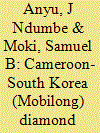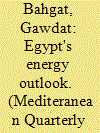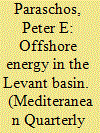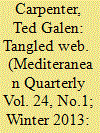|
|
|
Sort Order |
|
|
|
Items / Page
|
|
|
|
|
|
|
| Srl | Item |
| 1 |
ID:
120902


|
|
|
|
|
| Publication |
2013.
|
| Summary/Abstract |
In 2007, a South Korean geologist discovered large deposits of diamonds in Cameroon. To Cameroon, this discovery is particularly significant because it has the potential to engineer sustainable development. Cameroon suffers from acute levels of poverty, high unemployment, devastating levels of corruption, and bad governance. The spoils of diamonds could provide an undeniable avenue to engender sustainable development. However, if history is a guide, the examples of Angola, Sierra Leone, and Democratic Republic of Congo offer instructive lessons of destructive effects of diamond exploration in countries that are contemptuous of good governance and are experiencing lawlessness, economic deprivation, social unrest, and political instability. This essay provides a timely reminder to Cameroon on the consequences of mismanaged natural resources. It explores Cameroon's socioeconomic condition, examines the history of diamond exploration and mining in Cameroon, and analyzes the implications for sustainable development.
|
|
|
|
|
|
|
|
|
|
|
|
|
|
|
|
| 2 |
ID:
120900


|
|
|
|
|
| Publication |
2013.
|
| Summary/Abstract |
Greece's relationship with the Soviet Union was burdened by the Greek civil war, which was closely related to the outbreak of the Cold War in the Near East in 1946-47. The collapse of Greece's parliamentary regime in 1967 arrested a process toward détente undergone by practically every member state of the North Atlantic Treaty Organization in the 1960s. The new impetus in Greek- Soviet relations in the late 1970s, after the restoration of democracy in 1974, did not signify the loosening of Greek loyalty to the West but was a pragmatic pursuit of interests between two asymmetrical powers.
|
|
|
|
|
|
|
|
|
|
|
|
|
|
|
|
| 3 |
ID:
120898


|
|
|
|
|
| Publication |
2013.
|
| Summary/Abstract |
Egypt holds limited proven oil and gas reserves. Increasingly, these hydro-carbon resources cannot meet the country's rising energy demand. Consequently, Cairo has turned to nuclear and renewable power. In addition, the Egyptian authorities are under heavy pressure to restrain consumption and promote efficiency. Egypt needs to articulate and implement a long-term comprehensive energy strategy.
|
|
|
|
|
|
|
|
|
|
|
|
|
|
|
|
| 4 |
ID:
120901


|
|
|
|
|
| Publication |
2013.
|
| Summary/Abstract |
The authors propose a classification of the perceived corruption levels of Mediterranean countries according to key political, economic, and social factors. While relevant empirical research has shown the extent of corruption in various countries by analyzing differences in their respective values on a corruption perceptions index, the variables used here include additional data such as gross national income per person in purchasing power parities, a political rights index, a civil liberties index, and a nonincome human development index. Although northern Mediterranean countries are distinguished from Arab and Balkan countries, the labels developed and developing countries in the Mediterranean seem too simplistic when describing the marked heterogeneity within these two groups. The lack of homogeneity can be attributed to institutional and cultural country- specific factors rather than to crude differences in levels of economic development. This suggests that policies against corruption should target a complex ensemble of driving factors not limited to the economic characteristics of an individual country and should include social political, cultural, institutional, and territorial considerations.
|
|
|
|
|
|
|
|
|
|
|
|
|
|
|
|
| 5 |
ID:
120899


|
|
|
|
|
| Publication |
2013.
|
| Summary/Abstract |
With Israel and Cyprus recently confirming massive offshore gas reserves in the Levant Basin, the eastern Mediterranean Sea region is emerging as a significant new source of natural gas. The major economic and geopolitical implications explored in this essay include the accelerating regional competition to develop offshore energy resources; the related pursuit of major foreign investment for upstream energy development; consequences for regional gas export markets, notably the European Union; the influence of regional rivalries and conflicts on regional energy development; and the impact of the new energy resources on the regional balance of power.
|
|
|
|
|
|
|
|
|
|
|
|
|
|
|
|
| 6 |
ID:
120897


|
|
|
|
|
| Publication |
2013.
|
| Summary/Abstract |
Western news media outlets have paid considerable attention to the civil war in Syria, but much of the coverage is simplistic and melodramatic. Too many accounts portray the conflict as a Manichean struggle between the evil, brutal regime of Bashar al-Assad and noble freedom fighters seeking to create a new, democratic Syria. The reality is far more complex and murky. Syria's turmoil has troubling, long-term implications not only for that country but for the Middle East as a whole, and even for the international system. The searing images of civilian casualties coming out of Syria have been hard to watch. Several thousand innocent people perished between the eruption of resistance to Assad's regime in March 2011 and the beginning of 2013, with no end in sight. There is little doubt that government forces were responsible for the majority of deaths. The prospect that Assad might be overthrown is understandably appealing to Westerners from a moral standpoint, but the West needs to be fully aware of the potential for unintended, and possibly quite unpleasant, consequences.
|
|
|
|
|
|
|
|
|
|
|
|
|
|
|
|
|
|
|
|
|